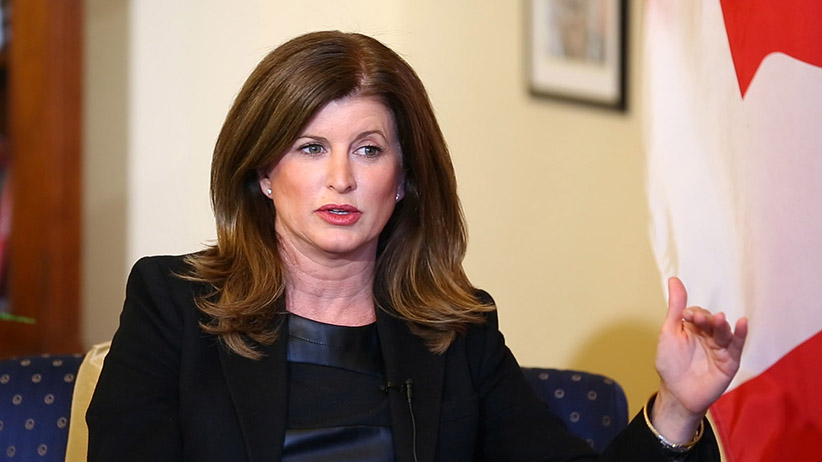Rona Ambrose works to break silence on the Hill
When allegations of sexual harassment surfaced on Parliament Hill, Health Minister Rona Ambrose set out to change the culture
Share

When two female NDP MPs alleged last fall that they were harassed by a pair of Liberal MPs, it was a wake-up call on Parliament Hill, a workplace often described as highly dysfunctional because of the late hours, boozy social engagements, disproportionate number of male MPs, and the fact that many politicians live away from their families. It emerged that there was no process to deal with complaints between MPs, and no training for anyone in avoiding or dealing with sexual harassment.
“Parliament Hill might be an old boys’ club, but I hope, through this experience, some of the boys might have learned a lesson . . . on what constitutes harassment in the workplace so maybe they don’t cross some of those lines,” Health Minister Rona Ambrose said in a recent interview at her East Block office on Parliament Hill.
Related: Megan Leslie on the conversation that’s not happening on the Hill
Ambrose, who used to volunteer in a women’s shelter and a rape crisis centre, has been a longtime advocate for reducing family violence, an issue she has made a priority in her role as health minister. She recently announced $100 million over 10 years for programs to create awareness and combat family violence. “I think women are the most repressed and oppressed group of people in the world. You can see it with the gang rapes in India, you can see it in Saudi Arabia with women not being able to vote or drive a car. And, unfortunately, we are seeing in some parts of the world a resurgence of these ideas, which is really troubling. And here in Canada, we’ve seen . . . [in] the reaction to things like the Jian Ghomeshi [allegations], that there are still people who don’t quite believe [such] things can happen here.”
Ambrose, 46, said she has heard rumours on the Hill but has never been harassed during her 10 years in Ottawa, nor as a provincial politician in Alberta. “I don’t know if it’s luck, but I haven’t had to deal with anything overt.” But she admitted there are grey areas. “If something happens to me or has happened to me, I’ve been able to manage and deal with it. I am an adult, and I am an equal.”
She spoke about the work environment, with MPs working around the clock and no spouses or children around to keep them balanced. “There’s no doubt it puts a pressure on people’s family life,” she said.
It’s an environment where many have noted a glaring power imbalance, with young aides and interns, many of them female, hoping to advance political careers. And it’s a culture that still allows a degree of sexism to be shrugged off, with female MPs the targets of comments about their appearance. Parliament Hill has, in other words, not evolved as have most civilized workplaces, including the public service, which has clear policies and training dealing with sexual harassment.
Ambrose gave a lot of thought to the people who work for her, after Liberal MPs Massimo Pacetti and Scott Andrews were accused of harassment. The two MPs were ejected from caucus last month. (Pacetti maintains he’s innocent, while Andrews says he accepts the findings—not yet made public—of an independent investigation into the claims.)
“I saw what happened on Parliament Hill and it occurred to me, okay, this was between MPs, but what if it had been one of my young, young staffers who had experienced something like this? That’s who I worry about.”
She and her staff recently signed up for Respect in the Workplace, which is run through the Respect Group, the organization co-founded by former hockey player Sheldon Kennedy to prevent abuse, bullying and harassment. (In December, the Board of Internal Economy released a new policy to deal with complaints between MPs and staff, which includes funds for training.) The online course, which is 90 minutes long, teaches what’s appropriate through workplace scenarios, and helps those who take it understand harassment and how to report complaints.
Ambrose sent out a message on Twitter encouraging other politicians to do the same. Tony Clement, president of the Treasury Board, and John Duncan, the Conservative whip, have since done the training and had their staff take the Respect in the Workplace course as well. Numerous MPs across the political parties have also done it, said Wayne McNeil, co-founder of the Respect Group.
Ambrose sees the fight against sexual harassment as part of a bigger problem: violence against women. According to a Statistics Canada report released earlier this year, seven in 10 victims of police-reported family violence were girls or women. “It’s still an area where people are like, ‘Well, that’s in the house,’ ” said Ambrose, who expressed frustration about the apathy in an advanced country such as Canada. “But I think we’ve finally gotten it out of the private sphere and into the public sphere. Twitter has been interesting in this debate, allowing women to come forward and talk about rape and family violence and other issues they might have experienced, without being revictimized in some way. I see this becoming a more mainstream conversation—and that’s really good.”